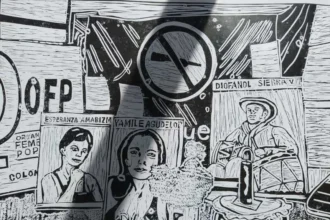Intimate violence often begins in private spaces, exploiting the vulnerability of victims who are silenced by fear, shame, and coercion. However, when survivors break their silence and bring these experiences into the public sphere, these once-hidden crimes demand societal attention and legal redress.
- The Mazan Case: Exposing a Violent Reality
- Legal and Human Rights Implications
- Chemical Submission: Violence Against Bodily Integrity
- Chemical Submission as a Form of Physical and Psychological Violence
- Legal Complexities in Addressing Chemical Violence
- Marital Sexual Violence: A Hidden Form of Domestic Violence
- Legislative Reforms: Strengthening Protections Against Violence
The transition from silence to the courtroom is a crucial turning point in the pursuit of justice, forcing society to confront difficult truths about violence, consent, accountability, and the vulnerability of those affected.
This shift not only challenges the systemic norms that perpetuate such violence but also highlights the need to protect women’s rights to bodily autonomy, dignity, and freedom from oppression. It underscores the importance of a legal system that safeguards women’s individual rights, addressing their vulnerability while promoting personal security and equality in society.
The Mazan Case: Exposing a Violent Reality
The Mazan case involves the rapes of Gisèle Pélicot by 51 men, highlighting how intimate partner violence can occur through chemical submission. Gisèle Pélicot courageously chose to make the trial public, stating it was necessary “so that the shame shifts sides”. This decision reflects her desire to remove the stigma and silence surrounding such crimes and place accountability on the perpetrators.
The concept of bodily integrity is a fundamental human right, grounded in the idea that each individual has the right to autonomy and control over their own body.
Her husband orchestrated the assaults by contacting men through the website Coco, inviting them into their home while Gisèle was drugged and unconscious. Over nearly a decade, she was subjected to repeated rapes, with her husband taking photos and videos of the abuse.
However, not all the men involved have been identified, and some claim the events were consensual, framing them as part of a libertine sexual game. The case is ongoing, with the trial expected to continue until mid-December 2024.
The case reveals critical gaps in French law concerning consent, particularly in scenarios involving incapacitation through drugs like GHB and benzodiazepines. These substances impair victims’ ability to resist or recall events, further complicating the legal process of proving non-consent.
Legal and Human Rights Implications
In the case of Gisèle Pélicot, legal and human rights considerations are central, especially given the involvement of chemical submission and multiple sexual assaults. The French legal framework provides certain protections, though critical gaps remain that undermine the effective prosecution of such crimes.

Legal Context in France
French law addresses crimes involving chemical submission through Article 222-15 of the French Criminal Code, which criminalizes the administration of substances that “impair a person’s physical or mental integrity without their knowledge”.
This law is particularly relevant in the context of Gisèle’s case, where drugs were used to incapacitate her, stripping her of any ability to consent. However, while this provision acknowledges the danger posed by drug-facilitated crimes, it is not always sufficient to address the complexities of such cases, especially when victims are unable to recall the events.
Article 222-23 defines rape as involving “violence, coercion, or surprise”, which in theory includes cases where victims are drugged. However, this definition still leaves room for ambiguity, particularly when the victim is incapacitated to the point of unconsciousness, making it difficult for prosecutors to prove non-consent in the absence of physical resistance or memory of the assault. The law does not fully address scenarios like Gisèle’s, where drug-induced amnesia complicates the ability to recall and testify about the events.
Furthermore, Article 222-24, which deals with aggravated rape, includes provisions that increase the severity of the crime when substances are administered to impair judgment or control. This article reflects an understanding of the predatory nature of chemical submission but does not eliminate the challenges faced by victims and law enforcement in securing convictions due to the difficulties in proving that drugs were involved and how they affected the victim’s capacity to consent.
International Human Rights Standards
From an international law perspective, several human rights conventions come into play. The European Convention on Human Rights (ECHR), under Article 3, guarantees freedom from torture or inhuman or degrading treatment.
Gisèle’s repeated assaults, carried out while she was drugged and unconscious, clearly violated her bodily autonomy, constituting degrading treatment. Additionally, Article 8 of the ECHR ensures respect for private and family life, which was grossly violated in her case through her husband’s orchestration of the assaults within the intimacy of their home.
The Istanbul Convention, particularly Article 36, is also pertinent, as it mandates the criminalization of “all non-consensual sexual acts, even in cases where the victim is incapacitated”. This convention emphasizes that consent must be active, clear, and informed, which was not the case for Gisèle, who was drugged and unaware of the assaults taking place.
Additionally, Article 33 addresses psychological violence, which is crucial in cases involving chemical submission, as the drugs not only affect the victim physically but also cause profound psychological trauma. In the Mazan case, the psychological toll of the repeated assaults, compounded by the inability to recall the events due to the drugs, represents a serious violation of Gisèle’s mental and emotional integrity.
Chemical Submission: Violence Against Bodily Integrity
The concept of bodily integrity is a fundamental human right, grounded in the idea that each individual has the right to autonomy and control over their own body, free from harm or violation. When this integrity is breached, particularly through acts of violence. It not only inflicts physical damage but also leaves deep psychological scars.
Victims of chemical submission often find themselves in an especially vulnerable position, not only because of the assault itself but also due to the challenges they face in recalling the events or seeking justice afterward. The use of substances introduces a new dimension of harm; one that exploits the victim’s trust in their own memory and bodily control. This form of violence against bodily integrity requires a nuanced understanding of how drugs impact both the legal process and the victims’ ability to defend their autonomy.
Chemical Submission as a Form of Physical and Psychological Violence
Chemical submission is a particularly heinous form of violence that disrupts the victim’s ability to consent, resist, or even comprehend the rape taking place. Substances like GHB, benzodiazepines, or other incapacitating drugs are often administered covertly, leaving victims unaware of their immediate vulnerability.
The physical aspect of chemical submission is rooted in its violation of the body’s autonomy. By rendering the victim unconscious or severely incapacitated, perpetrators strip away the individual’s ability to make decisions about their body, including the most basic right to say t to say “no”.
This invasion of physical integrity is compounded by the fact that victims are left defenseless, unable to protect themselves or escape the assault. Furthermore, because these substances often leave no immediate physical signs of violence, perpetrators are emboldened by the perceived anonymity of their crime, contributing to the prevalence of such attacks.
Survivors of chemical submission frequently suffer from long-term emotional and mental health issues, including anxiety, depression, and post-traumatic stress disorder (PTSD). The inability to recall the assault in full often exacerbates feelings of helplessness and guilt, as victims may question the reality of their experience or blame themselves for not resisting; a common psychological repercussion in cases of drug-facilitated sexual violence.
Legal Complexities in Addressing Chemical Violence
French law primarily focuses on physical force in rape cases, which does not fully capture the complexity of drug-facilitated sexual violence. A recent case heard by the Court of Appeal of Rennes on April 5, 2024, addressed the legal challenges of proving chemical submission. The court emphasized that chemical submission must be proven, not merely alleged, to be considered.
This ruling highlights the difficulties in prosecuting chemical submission cases, particularly when the victim’s altered state is not evident to others, to the victims themselves, or when there is no clear evidence of coercion or violence. Such cases illustrate the challenges victims face in securing justice when drugs impair their ability to recall the events and when forensic evidence is limited.
Forensic toxicology, especially through hair analysis, has become a crucial tool for proving chemical submission, but the short detection window of many drugs continues to challenge law enforcement’s ability to build strong cases. This was underscored in the Rennes case, where the court required concrete proof of chemical submission, reflecting the broader evidentiary challenges in such prosecutions.
Marital Sexual Violence: A Hidden Form of Domestic Violence

Marital Rape: The Intersection of Domestic and Sexual Violence
The Mazan case sheds light on the often-overlooked crime of marital rape. While France criminalized marital rape in 1990 under Article 222-22 of the Criminal Code, it remains difficult to prosecute, particularly when chemical submission is involved. As noted by Wilhem (2022), using substances like GHB in domestic settings further complicates the legal process, as the victim is often incapacitated and unable to provide coherent testimony.
The Power Dynamics of Marital Abuse
The use of drugs by husbands to incapacitate their wives represents a severe abuse of power. This dynamic exacerbates existing power imbalances in marital relationships, often resulting in profound psychological trauma for the victim. Furthermore, drug-induced amnesia impairs victims’ ability to recall the events, making it harder to seek legal recourse or obtain justice.
Legislative Reforms: Strengthening Protections Against Violence
The Mazan case and similar incidents have exposed critical gaps in French law, particularly regarding the concept of consent and the challenges posed by drug-facilitated sexual violence. To address these issues, Proposition de loi n° 2170, introduced in February 2024, seeks to explicitly enshrine the principle of affirmative consent in French law.
The proposal emphasizes that consent must be clear, voluntary, and continuously maintained throughout any sexual interaction. This marks a significant shift away from interpretations of consent based on silence or lack of resistance, which have allowed perpetrators of chemical submission crimes to evade justice.
French Minister of Justice, Didier Migaud, has been a strong advocate for these legal reforms, emphasizing that the law must recognize the incapacitating effects of drugs like GHB and benzodiazepines on victims, and that consent should not be assumed from passive behavior.
By adopting these changes, France will better align with international standards such as Article 36 of the Istanbul Convention, which mandates the criminalization of all non-consensual sexual acts, including those involving incapacitated victims. Article 43 further stresses that consent must be freely given and not inferred from the victim’s passivity or inability to resist.
Additionally, the GREVIO 2024 report highlights the need for systematic reforms in addressing chemical submission, calling for enhanced training for law enforcement and professionals in handling such cases. It also underscores the importance of better data collection to fully grasp the scope of drug-facilitated sexual violence. These reforms would bridge the current legal gaps and ensure that the notion of informed consent is central to legal proceedings, providing stronger protections for victims.
This proposed legislation also aligns with international efforts to strengthen the legal response to sexual violence. According to Amnesty International, only a handful of countries explicitly define non-consensual sex as rape. By prioritizing affirmative consent, France would not only comply with international human rights obligations but also provide a more robust legal framework for prosecuting cases of chemical submission.
Expanding the definition of rape in Article 222-23 of the French Criminal Code to include cases where victims are incapacitated by drugs is crucial. This would ensure that drug-facilitated sexual violence is fully recognized as rape, offering victims the legal support they need to pursue justice. The reforms reflect broader trends in international law, particularly the Directive 2012/29/EU on victims’ rights, which advocates for a victim-centered approach, ensuring that victims of sexual violence, including those incapacitated by drugs, receive comprehensive protections and access to justice.
Ultimately, these legislative reforms represent a critical step forward in closing the legal loopholes that have long enabled perpetrators of drug-facilitated sexual violence to avoid prosecution. By adopting affirmative consent and expanding the legal definition of rape, France would significantly strengthen protections for victims, ensuring that justice is served in cases like the Mazan trial and beyond.














